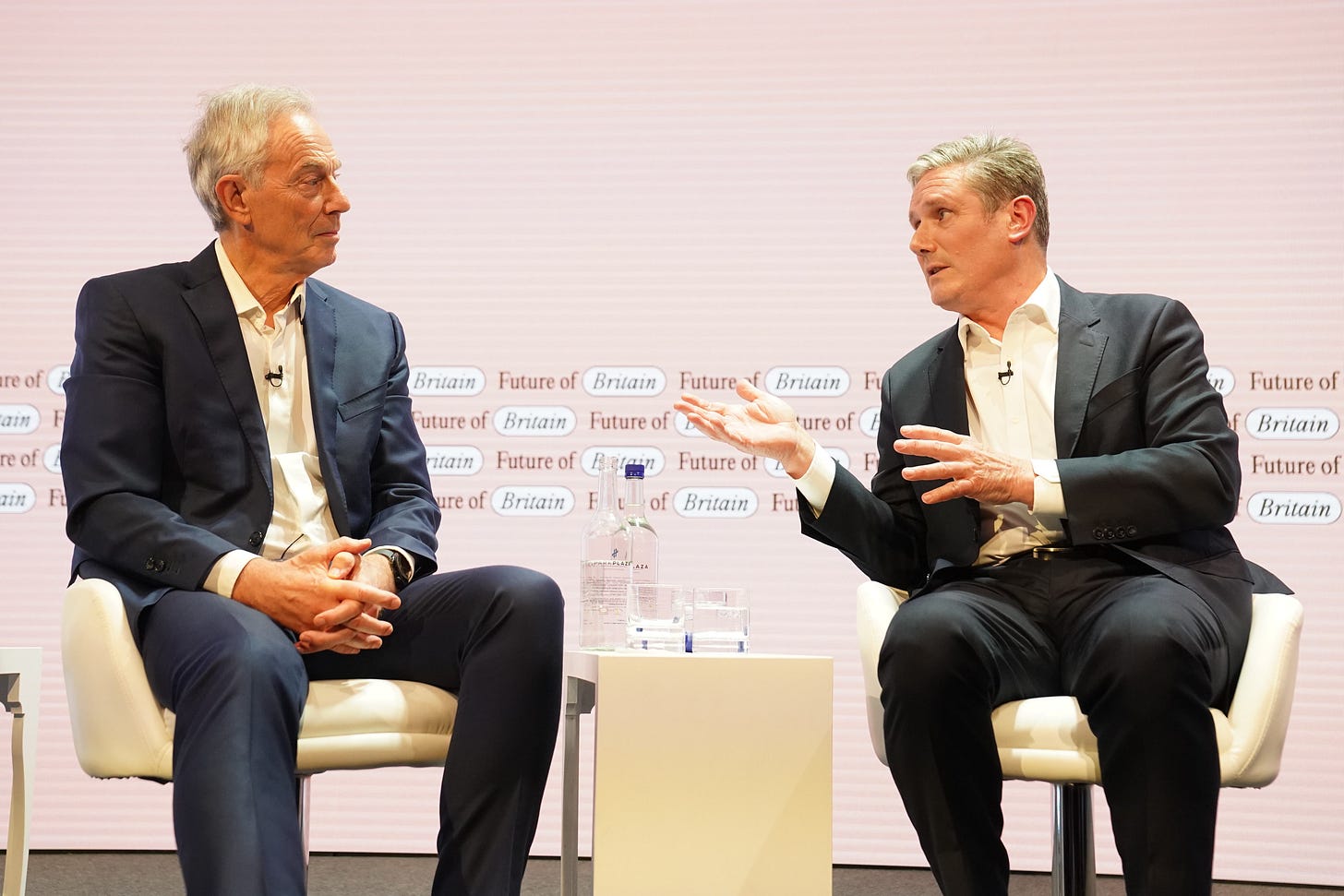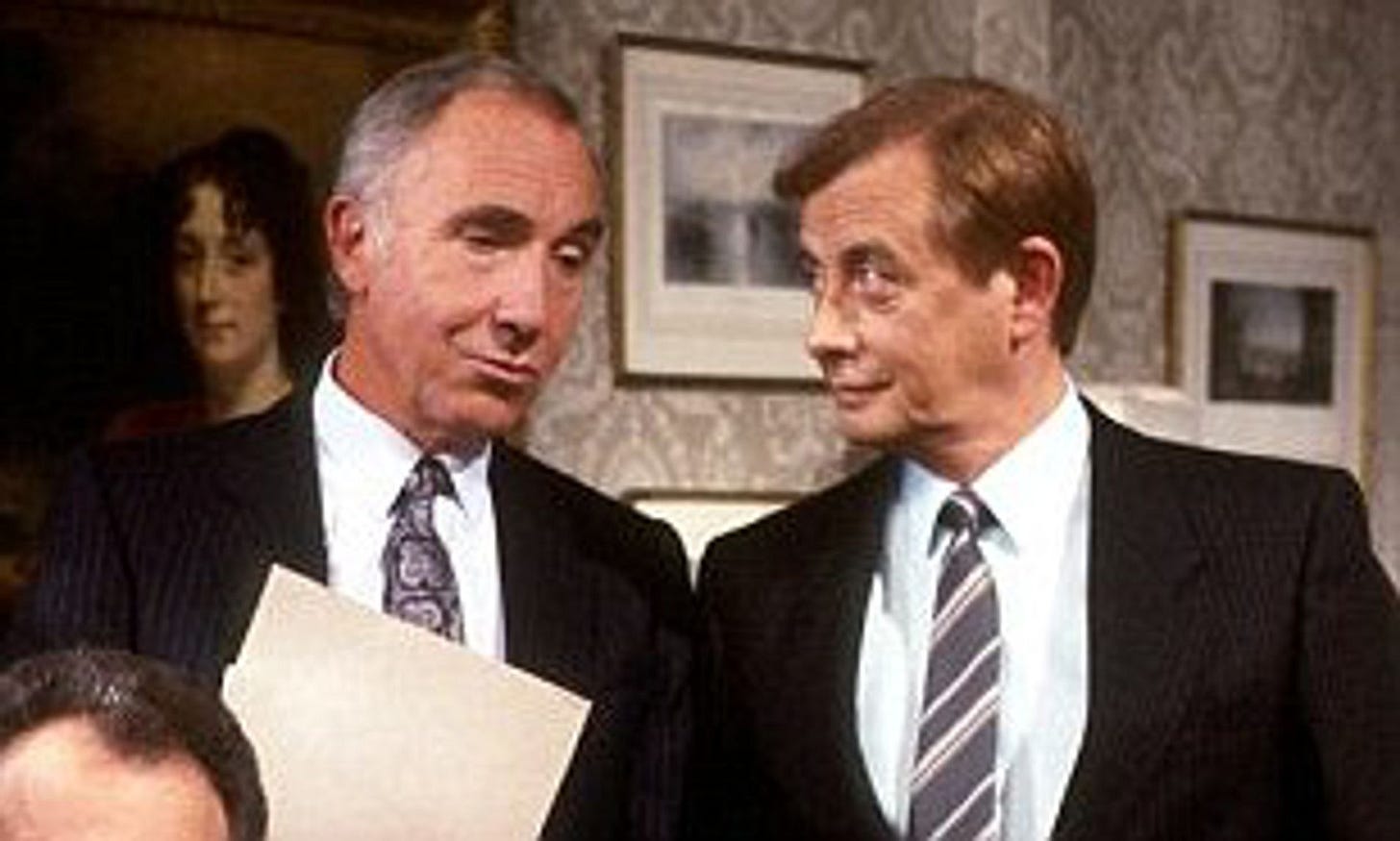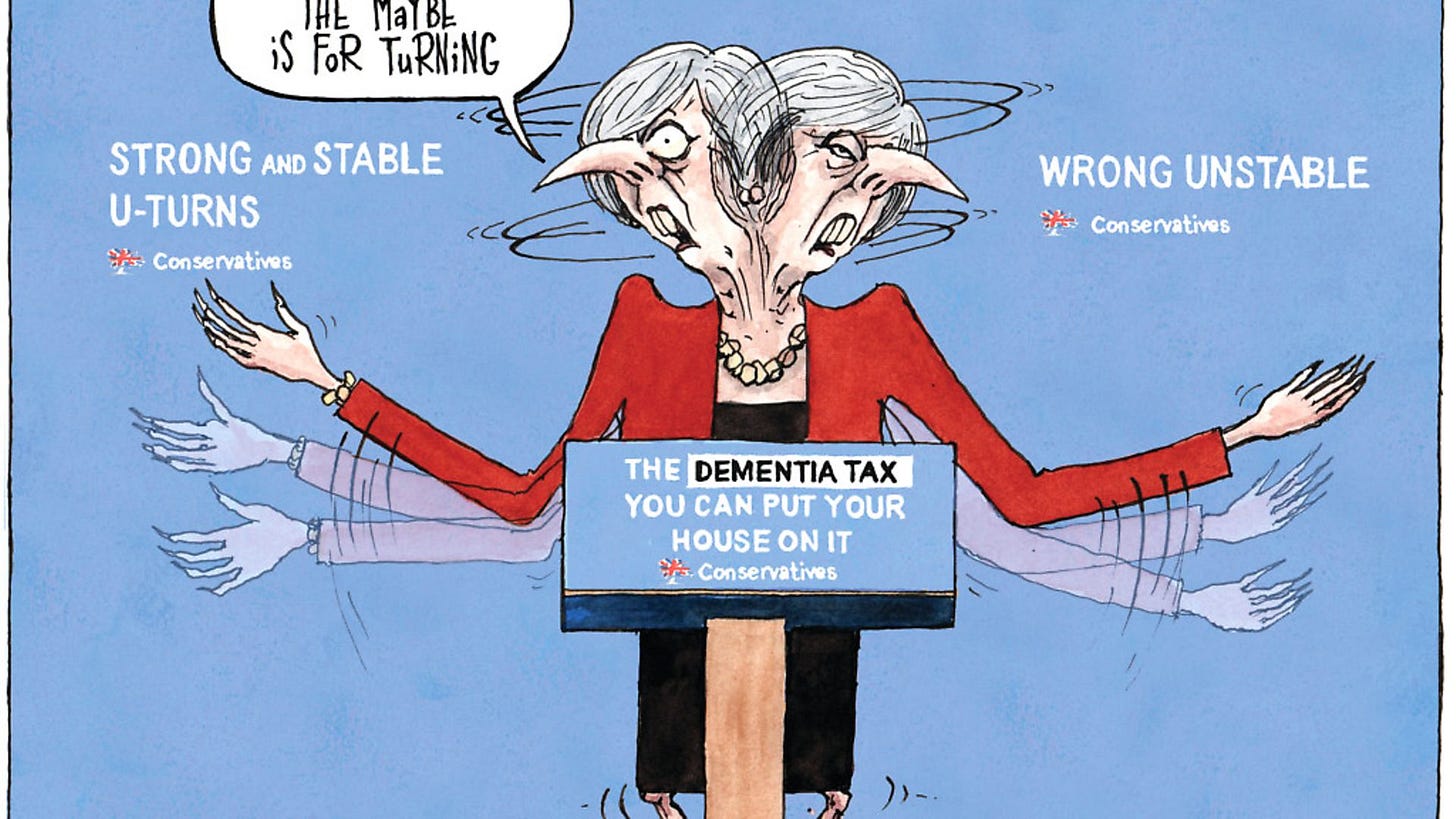The dangerous machismo of "difficult decisions"
Rishi Sunak, Keir Starmer and Humza Yousaf have all made a show of facing tough choices and facing them down, but one mustn't imagine that difficult means correct
One of the most well-known jokes (in a very strong field) in the BBC’s Yes, Minister/Yes, Prime Minister series is that politicians are horribly risk-averse, and that ministers can be rendered helpless with fear and dread if they take a decision which a civil servant describes as “courageous”. Ears attuned to danger prick up, we are to infer, and realise that courage implies threat and opposition. In the sixth episode of Yes, Minister, “The Right to Know”, Sir Humphrey Appleby, permanent secretary at the Department of Administrative Affairs, and his colleague Sir Frederick “Jumbo” Stewart, head of the Diplomatic Service, explain kindly to Bernard Woolley how a minister can be gently guided towards a desired destination.
Sir Frederick: There are four words to be included in a proposal if you want it thrown out.
Sir Humphrey: Complicated. Lengthy. Expensive. Controversial. And if you want to be really sure that the Minister doesn’t accept it, you must say the decision is “courageous”.
Bernard: And that’s worse than “controversial”?
Sir Humphrey: Oh, yes. “Controversial” only means “this will lose you votes”. “Courageous” means “this will lose you the election”!
It is one of the most iconic pieces of civil service wisdom that the writers, Jonathan Lynn and Antony Jay, coined, so much so that Graham McCann’s history of the series, published in 2014, was entitled A Very Courageous Decision. It retains a power in the Whitehall lexicon, even if largely in jest, and I have certainly once or twice told Members of Parliament that what they wanted to do was bold or “courageous”, and they have known what I meant.
Unusually for Lynn and Jay, it is a slight misstep. As a group, Members of Parliament—and therefore most ministers—tend towards risk-taking rather than shying away from it. Partly it is self-selecting: as Isabel Hardman’s recent excellent analysis Why We Get The Wrong Politicians showed at length, the process of becoming first a parliamentary candidate and then, for the lucky ones, a Member of Parliament is truly a “courageous” one, requiring men and women to put their careers and family lives in considerable jeopardy, not least financially, for very uncertain rewards. Yet the competition for candidacies tells us that this is not a major disincentive. Moreover, once they arrive at Westminster, there are many aspects of political life which are attractive to those who thrive on adrenaline, who are willing to take risks, whether that is the simple cut-and-thrust necessary for personal advancement, or potentially momentous events like important speeches, the introduction of bills or amendments and judgements like voting against the party whip or accepting or resigning ministerial office. So timidity is not common in the normal sense, and all too often one sees this instinct spill over into personal indiscretions, from Charles Stewart Parnell’s affair with Mrs Katherine O’Shea in the 1880s to the grim alleged drugs-and-alcohol-fuelled sexual harassment of young women by David Warburton only last year.
On the other hand, there is a plausible argument that civil servants are, as a class, risk-averse. The veteran Whitehall practitioner and observer, Martin Stanley, has laid out some reasons which might cause a conservative risk appetite among officials, and they are by no means solely attributable to the character of individual civil servants, but they represent a real problem which is having a major effect on policy-making. No-one wants a senior cadre who would by instinct head to the nearest casino clutching the petty cash, but we rely on officials to do more than wait for individual instances of ministerial dynamism and then produce a list of downsides.
Our current crop of political leaders has, instead, adopted a new approach to bravery in decision-making. The quality which everyone wants to be seen to possess is the willingness to “take tough decisions”. It’s a minor phraseological quirk, but once you’ve seen it once, you thereafter see it everywhere you look. The leader of the opposition, Sir Keir Starmer, was flexing his muscles last month, showing off the depths of the dilemma in which he found himself.
In 2015, George Osborne, then chancellor of the Exchequer, announced that, in pursuit of cost savings, the government would restrict the application of child tax credits to a parent’s first two children. It was part of an attempt to reduce the welfare budget by £4.4 billion, and was accompanied by a number of other measures, but opposition was fierce. Many predicted that the proposed cuts would fall most heavily on the least able to bear the loss of support, and there was particular piquancy about the notion of “restricting” numbers of children, a sinister echo for some partisans of China’s “one-child policy” (which was only just being amended in 2015).
Reversing the two-child cap on tax credits was expected to be high up the list of an incoming Labour government’s priorities. Moderately optimistic estimates said that scrapping the cap would “only” cost £1.4 billion, and would have the effect of lifting 270,000 households with children out of poverty. Not an absolute no-brainer, at least in financial terms, but when it comes to a balance between even semi-coherent policy-making and the reputational value of a few ministers or officials, there was surely no contest. High profile Labour figures, like Andy Burnham, mayor of Greater Manchester, and Dr Stella Creasy, a doggedly effective campaigner on many issues of poverty, pointed to what an easy win this would be: Creasy in particular suggested that abolishing the limit might increase revenue rather than represent an additional cost.
In the middle of July Starmer attended a conference organised by the Tony Blair Institute for Global Change, focusing on the theme of the Future of Britain 2023. The Labour leader was, in fact, interviewed by Sir Tony Blair himself, surely the closest New Labour cosplayers get to the presence of God nowadays, by the end it seemed to me that Blair’s declaratory delivery and its slightly staccato accompaniment of hard-wired virtue had never really been away at all. Starmer used the opportunity to announced that he would not at reverse the two-child limit. Once Starmer made that reaching that decision, Blair listened on more gravely as a man who desperately wants to be entrusted with heavy responsibility sketched in some details. Any new government eager to maintain popular support would have to work in increments, and that would involve being “really ruthless”. Indeed, Starmer dwelt on the importance of being as well as seeming tough.
We keep saying collectively as a party that we have to make tough decisions. And in the abstract, everyone says: ‘That’s right Keir.’ But then we get into the tough decision—we’ve been in one of those for the last few days—and they say: ‘We don’t like that, can we just not make that one, I’m sure there is another tough decision somewhere else we can make.’ But we have to take the tough decisions.
As an analysis of one of the challenges of party leadership, it is actually not bad. He neatly skewered the lazy, minimum-risk approach that it is easy for his colleagues to pursue. And Starmer kept pushing the message home, reminding his comrades that the party had to seem “even tougher, even more focused, even more disciplined” than it had already been, to maintain a fundamental image of competence.
This isn’t an effect restricted to Starmer. When Rishi Sunak took over as prime minister in October, he spoke of the fact that he would need to take “difficult decisions” to address the country’s economic travails; only a few weeks before, Liz Truss, having won her party’s leadership, spoke of “taking tough decisions” to transform the economy and the country. Sir Ed Davey, the Liberal Democrat leader, often uses his fragments of publicity to criticise both major parties for ducking these dilemmas; and sharp ears would have heard the phrase scattered through the speech made by Humza Yousaf, the recently elected first minister of Scotland.
To an extent, it is a sign of maturity that MPs are willing to talk realistically rather than simply asserting, to borrow the words of Julian of Norwich, “All shall be well, and all shall be well and all manner of thing shall be well”. And of course there is an element of expectation management; it is better, most politicians would agree, to under-perform and over-deliver (the difficulty being in politics that too much underpromising means you are never given the opportunity to prove yourselves). There is something rather chilling, it must be said, when politicians are gathered together and they explain that there is no plausible solution to a problem, that both sides can come out of the process but only if there is good will; it can, in short, veer into self-pity and a shrugging to “understand”.
However, I think there is another issue, one which it is easy to ignore. The more we tell ourselves that we have taken decisions in a perfectly rational atmosphere, the more likely we are to tell ourselves that our conclusions must be correct. It is psychologically satisfying to think we, though onto have ourselves. We come back to bravery: if you are being attacked for one of these “difficult” decisions, you must surely have hit a nerve, there must be a victory to be scented. “Necessary but unpopular” is a recognised political trope, and politicians fancy that it is the sort of decision which will play well when history comes to be written. But if you commit yourself completely to a cause, and it grows hugely important, you do sometimes stop listening to others, retreating to a safe circle of friends?
Think about the “dementia tax” of the 2017 general election. In 2011, the Commission on Funding of Care and Support, chaired by Andrew Dilnot, principal of St Hugh’s College, Oxford, had produced a robust report examining the transformation of the funding and provision of social care. It was a serious piece of work, addressing a policy area we are still not able to resolve, but it emphasised there were, to coin a phrase, difficult decisions. One aspect of the provisions which caused anger was classifying Alzheimer’s patients and their carers in the category of social care rather than health, so that they would have to bear most of their costs themselves. Whatever the politics of this, it was quickly dubbed the “dementia tax”, and, with that memorable tag, was a significant plank in the Conservative 2017 manifesto. But it was easily bundled together with the abolition of the “triple lock” on state pension increases and a proposal to scrap the universal Winter Fuel Payment to make Theresa May’s party look hostile towards older voters. However, May’s virtues as a leader did not include nuance or flexibility, and criticism made her only more determined in her position. She had indicated she was ready to take difficult decisions, but the electorate was not sure it wanted her to.
We are very susceptible to self-deceit. Human beings can lie to ourselves about our motives, our judgement and our receptability to compromise according to circumstance. And the current embrace of “taking difficult decisions” might end up very damaging. The degree of difficulty or controversy does not match absolutely perfectly: perhaps some strand of our Puritan forebears relishes conflict and tells us, like sixth-form revolutionaries, that it’s only when you hit the target of a given policy that vested interests arise and oppose you. Sometimes there is a need for toughness, and that quality is still a powerful one in favour of Margaret Thatcher in many Conservative circles: the dark economic days of 1980/81/82 were so nearly her downfall but she pressed ahead with the programme and won, and 40 years one we forget how impossibly and implacably hectoring she could be, whether right or wrong.
And so back to Sir Keir Starmer. He knows that he has a good chance, let us quantify it no more specifically than that, of being prime minister and first lord of the Treasury by Christmas 2024. No-one should underestimate the importance of that plain fact: while we are on our fifth Conservative prime minister inside a decade, there have only ever been six Labour prime ministers. The idea that Starmer can brush with the toips of highers the notion of being the seventh is enormously potent, but it must breed dread too. What could go wrong? How could matters change between now and then? So of course Starmer is cautious, of course he doesn’t want to seem insincere or glib or showy. But, setting aside my own political views, I think Starmer runs the risk of becoming petrified: in his KC’s mind, he is reflecting that doing nothing can be a safe option.
He may be right. But most commentators agree that, however far ahead the Labour Party is in the opinion polls, Starmer generates none of the buzz or the sense of promise that Blair did in the mid-1990s. The milieu is different and the two men’s personalities are different. But the current leader of the opposition must then keep a double watch: first, that a decision being difficult does not ipso facto make it correct, and that expectations should be managed, not suppressed below a level of basic existence. Hopefully this phase will pass, and in a couple of years we will not be seeking to measure our worth by how little a mark we make on the scenery as we go through.








